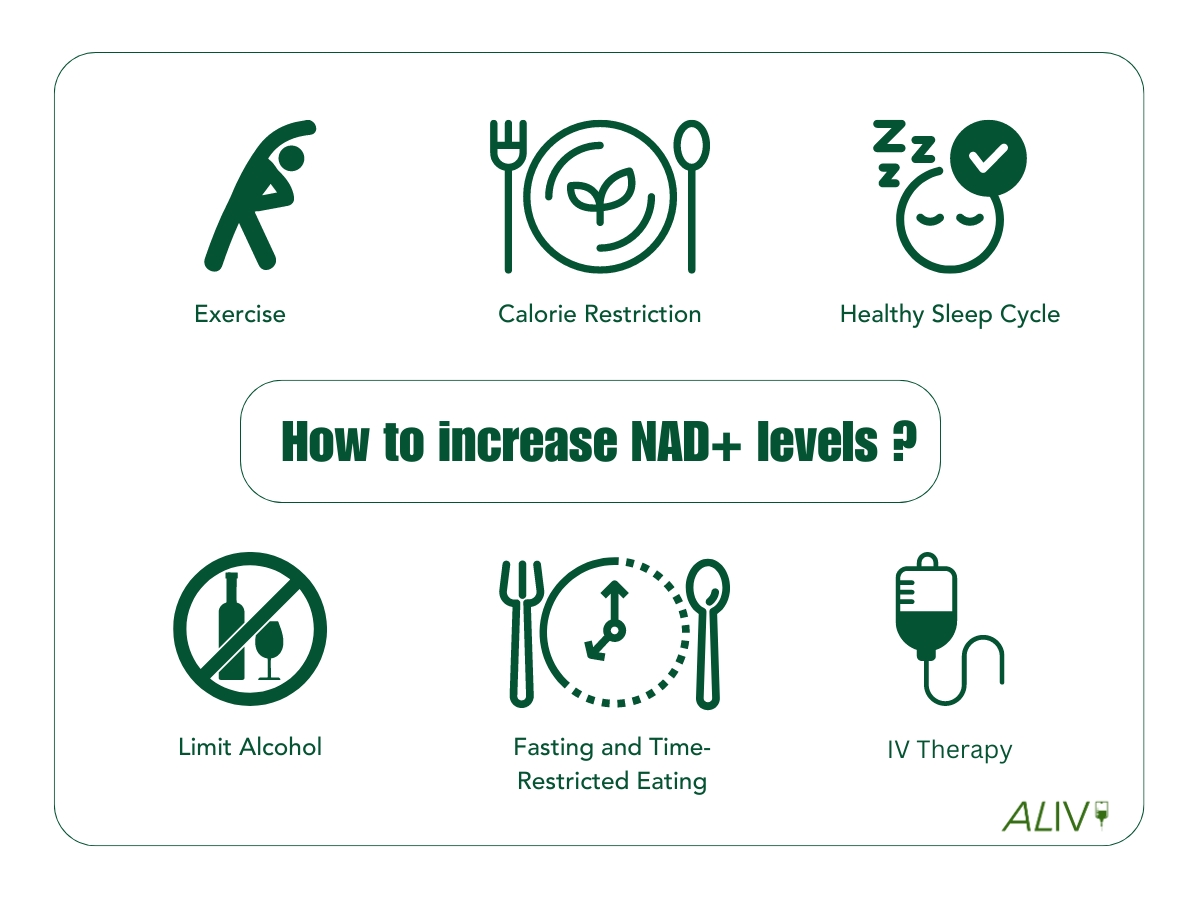What is NAD & Why NAD is Important? - Benefits of NAD
August 07 2024


What Is Nicotinamide Adenine Dinucleotide (NAD)?
NAD+ is an important metabolite that helps produce energy in the mitochondria of each cell. Mitochondria are the powerhouse of the cell. NAD+ levels in our body lower due to plethora factors such as aging, a sedentary & unhealthy lifestyle, and exposure to toxins such as alcohol and cigarettes. The decline in NAD+ levels can cause many health issues as well.
What is the role of NAD in the body?
NAD (Nicotinamide Adenine Dinucleotide) plays an important role in the body as a coenzyme found in all living beings. It is important for various metabolic processes and to convert nutrients to energy. Below are a few key functions of NAD in one’s body:
- Energy Metabolism: NAD is vital in the metabolic processes that convert food into energy. It functions primarily in the oxidative reactions that release energy from glucose, fats, and proteins.
- DNA Repair: NAD is important for the repair of damaged DNA. It helps maintain the integrity of genetic information and supports cellular health and function.
- Cell Signalling: NAD acts as a signalling molecule, involved in various cellular processes, including cell death, stress responses, and aging. It plays a role in signalling pathways that maintain cell health and survival.
- Gene Expression: NAD influences gene expression related to stress resistance, metabolism, and survival, helping to regulate cellular processes and responses to environmental changes.
- Sirtuin Activation: NAD is essential for the activation of sirtuins, a family of proteins involved in aging, gene regulation, and stress resistance. Sirtuins use NAD to remove acetyl groups from proteins, which is crucial for DNA repair and metabolic regulation.
- Oxidative Stress Reduction: NAD helps combat oxidative stress by functioning in the antioxidant defenses of the body. This includes regenerating reduced forms of antioxidant vitamins like Vitamin C and E, helping protect cells from damage caused by free radicals.
Due to its wide-reaching roles in energy metabolism, DNA repair, and cellular signalling, maintaining optimal levels of NAD is seen as beneficial for overall health, particularly in the context of aging and chronic diseases.
Why is Nicotinamide Adenine Dinucleotide (NAD) Important?
NAD+ is a vital metabolite that aids energy production in the mitochondria of each cell in the body. It is vital not only for converting food into energy but also for preserving DNA integrity and supporting proper cellular function, which helps safeguard our bodies against aging and disease.
What Causes Decreases in NAD+?
Have you ever wondered how a young child remains so energetic throughout the day, but an older person gets tired faster? Here's where NAD+ comes into play. With age, the levels of NAD+ in our body reduce. As mentioned before, aging can cause a reduction in the levels, but factors like lifestyle choices and toxin use can also increase the speed of reduction. As we age, we can lose up to 50% of our NAD+ levels.
Lowered NAD+ levels in the body can act as a barrier for mitochondrial function. This may contribute to many diseases such as cancer, diabetes, immune system conditions, heart issues, etc.
Can You Increase Your NAD+ Levels? How to Increase Your NAD+ Levels?
Yes, NAD+ levels can be increased, and this can turn out to be very beneficial to health, as it can help improve cellular metabolism, DNA repair, etc. Here are a few ways to increase NAD+ levels-
1. Dietary Changes:
- NAD+ precursors are found in small amounts in foods like milk and vegetables. Supplements composed of NR or NMN can directly increase NAD+ levels in the body.
- Foods like turkey, chicken, peanuts, mushrooms, green peas, and avocados are rich in niacin, which can increase NAD+ levels.
2. Calorie Restriction:
- It is seen that calorie deficit diets activate enzymes called sirtuins, which depend on NAD+ to function well.
3. Exercise:
- Regular exercise can boost sirtuins and promote better mitochondrial function, eventually leading to better health.
4. Fasting and Time-Restricted Eating:
- Fasting or time restricted eating can boost NAD+ levels as they are linked with better metabolic function and energy.
5. Sleep:
- Maintaining a healthy circadian rhythm and getting sufficient sleep can help regulate NAD+ levels in the body.
6. Supplements:
- NAD+ supplements can boost these levels in one's body. The effectiveness is not certain, as it depends on each individual.
7. IV Therapy:
- IV therapy has proved to be one of the most efficient ways to supplement one's body with NAD+. As it skips the digestive tract, directly into the bloodstream, providing 100% absorption and cellular uptake.
8. Limit Alcohol Consumption:
- Studies have shown that alcohol consumption leads to a reduction in NAD+ levels in one's body. Hence, limiting alcohol consumption is important.
By incorporating these small lifestyle changes, one can boost their NAD+ levels and age gracefully.
What are the ultimate benefits of Nicotinamide Adenine Dinucleotide (NAD)?
There are many ways one can benefit from NAD+. NAD+ is a crucial part of one's body mechanism. Here are a few potential benefits-
Energy Production: Helps the conversion of food into energy, important for cellular metabolism.
DNA Repair: Plays an important role in repairing broken DNA strands, crucial for genomic integrity.
Cell Longevity: Activates enzymes linked to anti-aging elements that extend cell life.
Neuroprotection: Supports neuron health, beneficial for neurodegenerative diseases by enabling neuronal energy production and DNA repair.
Oxidative Stress Reduction: Helps fight oxidative stress, by reducing cellular damage linked to aging and diseases.
Circadian Rhythm Support: It has an influence on the body’s internal clock, affecting sleep, metabolism, and overall health.
Enhanced Physical Performance: improves muscle function and endurance.
Improved Mental Clarity: Evidence suggests it helps sharpen cognitive function.
Cardiovascular Health: It may improve energy production in heart muscles and reduce oxidative stress.
Liver Health Support: Aids liver cells in metabolizing fats and alcohol, promoting liver health.
Mood Regulation: May influence mood and mental health.
FAQ
Q1. What food has NAD?
Ans. Foods like turkey, chicken, peanuts, mushrooms, green peas, and avocados are rich in niacin, which can increase NAD+ levels.
Q2. Is NAD just vitamin B3?
Ans. No, NAD is not just vitamin B3, although they are very closely related. Vitamin B3 is also known as niacin, which comes in many forms, including nicotinic acid and nicotinamide. These compounds are precursors to NAD. The body can convert forms of vitamin B3 into NAD through various biochemical pathways.
Q3. Can NAD reverse aging?
Ans. NAD+ cannot reverse aging but can help reduce some aging effects by supporting DNA repair and cellular metabolism.
Q4. At what age does NAD decrease?
Ans. NAD+ starts decreasing in the mid-20s and diminishes gradually going forward.